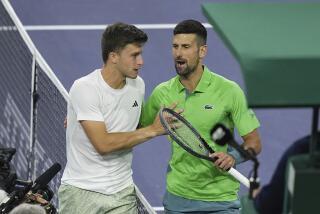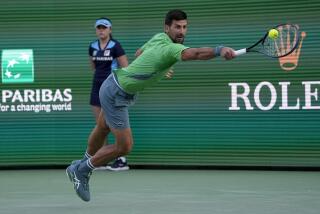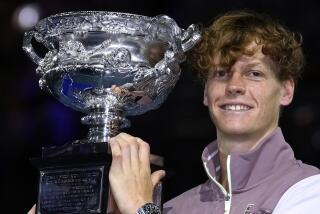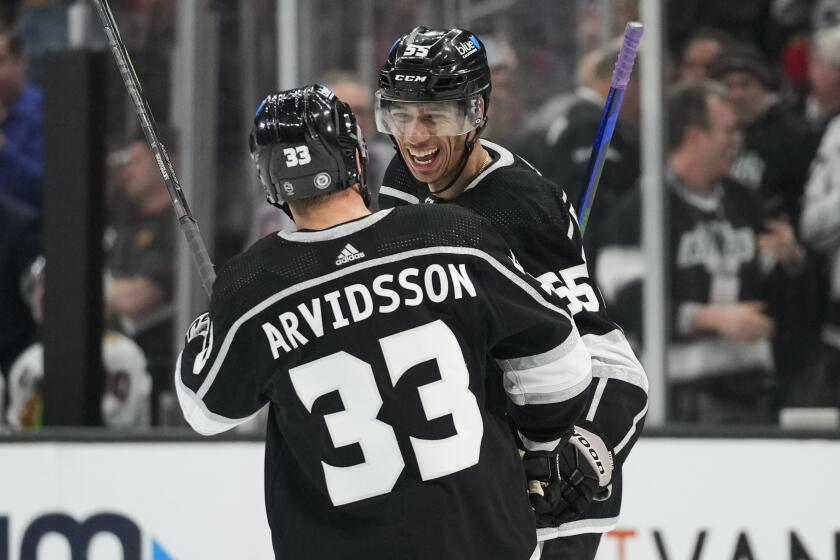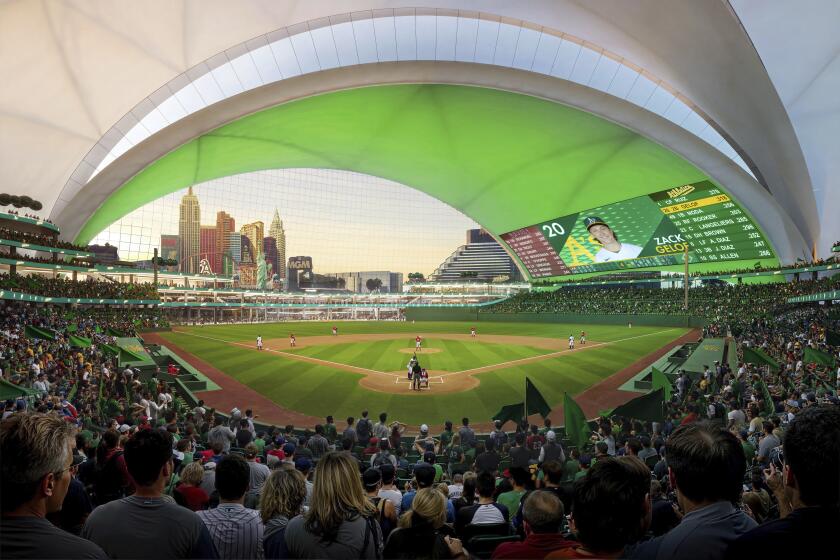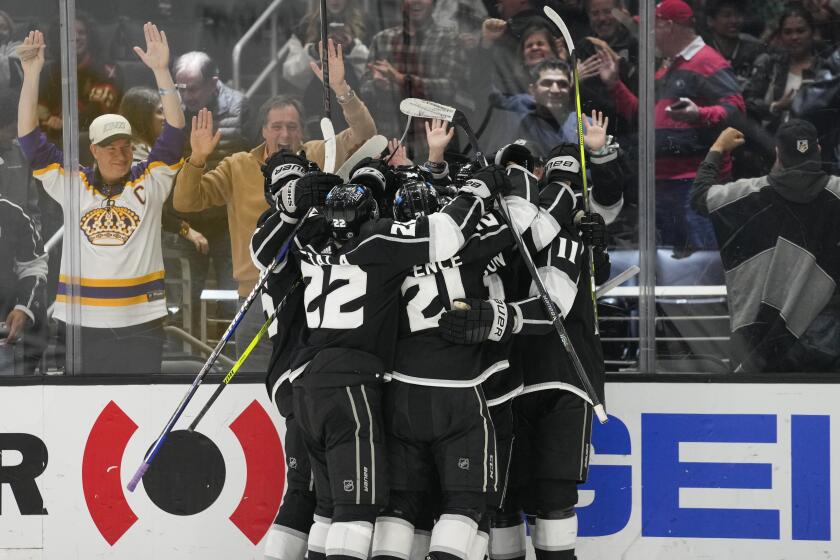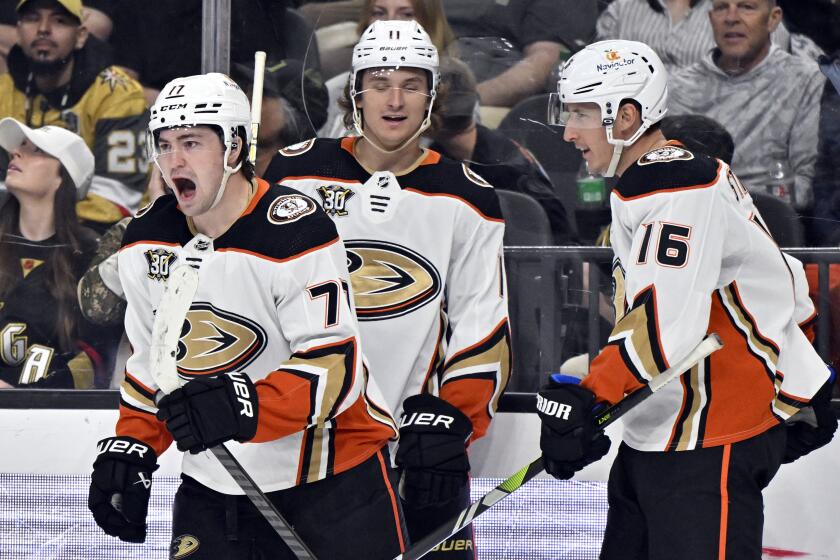French Open: Djokovic discusses lack of confidence after French Open win
Despite all of Novak Djokovic’s success over the years — the 12 major championships, the career Grand Slam, the time ranked No. 1 — he still finds himself searching for self-confidence these days.
That’s what an elbow injury and forced absence from the ATP tour can do to a player.
Djokovic was reflective and revealing Wednesday after moving into the third round at the French Open by virtue of a self-described up-and-down performance in a 7-6 (1), 6-4, 6-4 victory over 155th-ranked Jaume Antoni Munar Clar of Spain. Both of Djokovic’s matches so far have been against qualifiers; neither win was particularly impressive.
“At the moment, I’m not playing at the level I wish to, but at the same time, I understand that it is the process that obviously takes time,” said Djokovic, whose seeding of No. 20 is his lowest at a Slam in 12 years. “And I’m trying to not give up.”
At least he got through in straight sets, saving energy for whatever might come next at Roland Garros. Other leading men were forced to work a lot harder in matches they would have been expected to breeze through: No. 2-seeded Alexander Zverev, No. 4 Grigor Dimitrov and No. 19 Kei Nishikori all faced two-sets-to-one deficits and all emerged to win Wednesday.
Zverev was down by a set and a break early — and down a racket he’d obliterated by then, too — before collecting himself and coming back to beat 60th-ranked Dusan Lajovic of Serbia 2-6, 7-5, 4-6, 6-1, 6-2. Dimitrov was two points from defeat against 21-year-old American Jared Donaldson but won 6-7 (2), 6-4, 4-6, 6-4, 10-8 in a marathon that lasted 4 hours, 19 minutes and featured a couple of underhand serves by the cramping Donaldson. Nishikori got past Benoit Paire of France 6-3, 2-6, 4-6, 6-2, 6-3.
A reporter asked Zverev about what he told himself while trailing in order to turn his match around.
The 21-year-old German scoffed at the premise.
“I mean, you guys make it sound like we think about it, really. We don’t. We just try to play and win each point, each game. Being two sets to one down is like being a set (behind) in a three-set match. We’re not going to overthink it: `Oh, I’m two sets to one down. What am I going to do? How am I going to play the next point?“’ he responded. “We try to play our best. We try to maybe change a few tactics and see how we can win the next point and the next game.”
The lengths, if not quality, of those matches were what amounted to on-court intrigue on Day 4 at the clay-court major, because there really was little in the way of stunning outcomes. The only top-16-seeded man or woman who lost was No. 12 Sam Querrey of the U.S., and he’s only once been as far as the third round in 12 appearances at Roland Garros.
Among the women, No. 1 Simona Halep shook off a slow start in a postponed first-round match to defeat Alison Riske of the U.S. 2-6, 6-1, 6-1, while second-round winners included reigning major champions Caroline Wozniacki and Sloane Stephens, along with No. 4 Elina Svitolina, No. 8 Petra Kvitova and No. 13 Madison Keys.
So perhaps the most meaningful moments around the grounds came inside the main interview room as Djokovic discussed his state of mind as he tries to regain his previous status in tennis.
He sat out the last half of 2017 because of a painful right elbow, tried to return in January, then decided to have an operation in February.
Djokovic arrived at Roland Garros with a 10-7 record this season. He was at .500 until showing signs of a resurgence by getting to the Italian Open semifinals on red clay before losing to 10-time French Open champion Rafael Nadal.
“Best practice that you can have is a match. I haven’t had too many matches, and I really never thought that I’m going to be challenged in that way, mentally — that I need matches in order to get confidence. But obviously I’m learning something new, and, yeah, that’s the case,” said Djokovic, who hasn’t won a Grand Slam title since claiming his fourth in a row at the 2016 French Open.
“At times, I do lose maybe a comfort level on the court and confidence, and that’s something that I’m still building gradually, obviously,” he continued. “The more matches I play, the better it is. The more I win, of course, the better it is. Hopefully that can keep going.”
More to Read
Get our high school sports newsletter
Prep Rally is devoted to the SoCal high school sports experience, bringing you scores, stories and a behind-the-scenes look at what makes prep sports so popular.
You may occasionally receive promotional content from the Los Angeles Times.
